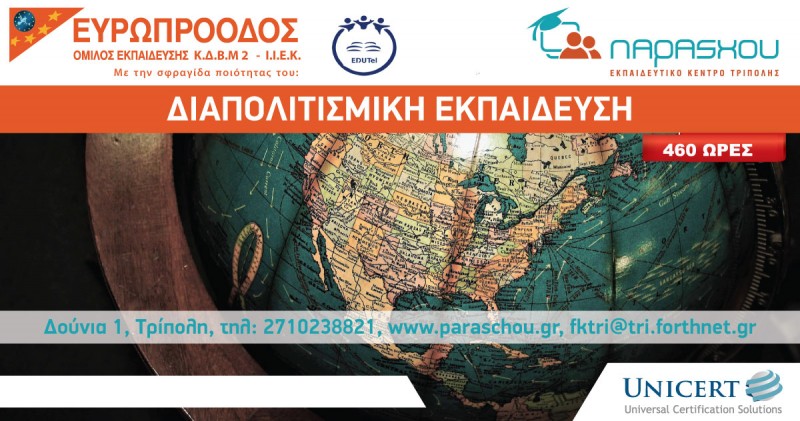Duration: 460 hours / 7 months
PURPOSE OF THE PROGRAM
The purpose of the program is to provide students with basic knowledge of the principles of Intercultural Education. In addition, to develop teaching plans that are in line with the philosophy and goals of Intercultural Education, to organize teaching programs in Greek as a second or foreign language using New Technologies, to utilize effective methods of approaching teaching and learning in teaching. , in Lifelong Learning Structures, in Primary and Secondary Education, in Asylum Seekers Hosting Centers, in penitentiary establishments, in residential accommodation facilities and in places where Roma, Muslims and others are educated.
TARGET AUDIENCE
• To teachers who work or are going to work in Lifelong Learning Centers and Lifelong Learning Structures.
• To Adult Trainers.
• To educators and educators involved in the education of immigrants, refugees, Roma, Muslims and other vulnerable social groups.
• To career counselors.
• Undergraduate and postgraduate specialty students who can teach in Lifelong Learning Structures.
• To Sociologists, Psychologists, Social Workers and other scientists of different directions and specialties.
• To those who are active in the field of intercultural education.
WHY DO I FOLLOW IT?
• Seriously considered for employment in Private Educational Organizations (Level 2 CRMs, IEKs, Private Schools, Colleges, Tutorials, etc.).
TOPICS
• Intercultural Education: Conceptual Framework, Theoretical Approaches and Reflections
• Multicultural communication
• Experiential learning in intercultural education
• The intercultural dimension in elementary education and teacher training
• Educational policy issues
• Basic principles of implementation of Intercultural Education
• International examples of multicultural school pedagogical development
The refugee phenomenon
The phenomenon of migration
Training for Vulnerable Social Groups
• Stereotypes, Prejudices and Racism
School violence and multiculturalism
• Intercultural Education in Greece
• Life in the classroom
Education of Roma in Greece and internationally
The education of the Muslim minority of Thrace
The education of refugees in Greece
Educational and Intercultural Competence and Preparedness of Primary and Secondary Education Teachers
• Modern Teaching Methods
• Didactic Approach to Interculturalism
• Intercultural education and subjects
• Interculturalism – multiculturalism and conflict management
• Reflective curricula and forms of Greek language education
• Methods of teaching Modern Greek as a second / foreign language
METHODOLOGY
The training seminar:
• modern and asynchronous teleconferencing.
• Continuous feedback of questions, questions and clarifications from the instructor in charge.
• Includes a textbook, additional educational material, audiovisual material, scientific articles, dissertations, doctoral theses and related literature.
• The final evaluation of the seminar includes the preparation of the final work, the implementation of short educational activities and self-assessments per thematic unit of the seminar.

